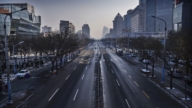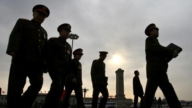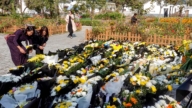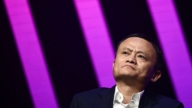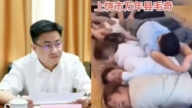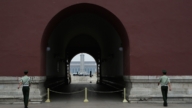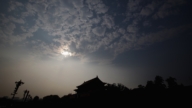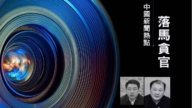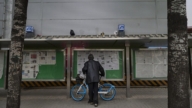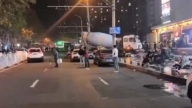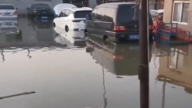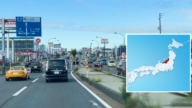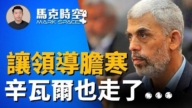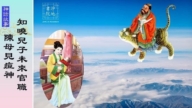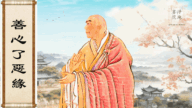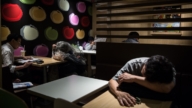【新唐人2013年02月21日訊】預定在3月舉行的兩會,標誌著中共從18大開始的人事換屆交接結束,國內外熱衷於猜測新領導人習近平,將帶領中國走上一條甚麼路。官方媒體19號引述港媒的評論說,習李新政煥發正能量。媒體的期待和溢美之詞,令人不由想起胡、溫的當年。
香港《大公報》的文章總結了習近平、李克強近期在軍事、外交、反腐和經濟發展幾方面的言論,認爲他們在各領域都有新思路、新提法,新政煥發正能量。
對此,多位評論人士指出,習、李新上臺後的舉措,仍然沒有從根本上解決中國的問題。
中國社會民主黨中央委員會主持人劉因全:「習李最近的表現,還是在原來的體制之內做一些開明的動作,我認為,如果不改變這種體制,這些領導人只做一些開明的動作,不會解決根本問題。」
中國民主黨全委會美國委員會主席張健:「習李新政有甚麼呢?就是穿新鞋走老路、新瓶裝舊酒,維護共產黨體制去盤剝人民,維護寡頭集團的利益,去把中共岌岌可危的統治他想苟延殘喘。」
《大公報》文章認爲,習近平顯示了澄清吏治的決心,因此近期四川省委副書記李春城、中央編譯局局長衣俊卿等省部級高官,和一大批廳局級官員因違紀落馬。
對此,劉因全估計,習、李在兩會後,可能還會在反腐方面採取一些動作,但能走多遠?還有待觀察。
劉因全:「估計兩會以後,習、李會採取一些新的動作。但是因為中國積重難返,特別是江澤民這個班子造成了太大的負面作用,習、李上臺以後還會受原來的既得利益集團的制約。他們釋放出來的一些新思路,也會被這些利益集團大打折扣,慢慢給它消融掉。」
在經濟方面,《大公報》認爲,習、李在多個場合的講話,體現出他們重視經濟發展的品質和效益。評論指出,中共前幾年爲了拉動GDP而透支了環境成本和道德成本,再沿著之前的路已經走不通。
張健﹕「中國的經濟體制改革,有人說它已經經過這麼多年的飛躍,但是你看一看,我們的子孫要承擔的後果到底是甚麼?我們的後幾代的子孫,要面臨非常有毒的環境,可能人類的生存都已經不適宜了,這樣的情況下,他還捧出一朵盛開的罌粟花,這難道不是最大的嘲諷嗎?」
張健認爲,要進行經濟改革,勢必也要進行政治改革。
張健:「對於中共來說,它想改革經濟,經濟體制改革一定與政治體制改革是雙軌制,就像一個火車軌道一樣,不能用一根軌道去開另一個火車,當中國政治體制改革走入死胡同以後,那麼經濟體制改革一定會遇到一個瓶頸。」
如今國內媒體對習李新政的溢美之詞,無不令人聯想到當年的胡溫新政。胡、溫剛執政時,同樣被認爲會給中國政壇帶來清風。他們提出的「和諧社會」讓海內外民主人士曾經一度有所期待。
劉因全:「中國呢根本上還是一個體制問題,你像溫家寶吧,他大聲疾呼改革,而且做了很多很多動作,還是被既得利益集團限制的死死的。」
劉因全認為,現行中共體制下,心懷改革志向的領導者是非常悲哀的,如果他同流合污,就會背上罵名,如果他想有新的思路,新的改革,就會被體制排斥、打擊,甚至像趙紫陽那樣被抹消。
採訪/李韻 編輯/尚燕 後製/鍾元
Interpretations of the new Xi-Li Administration
The “Two Sessions” of the Chinese Communist Party(CCP)
are scheduled to be held in March,
marking the end of the leadership transition
started after the 18th Party Congress.
What road will new leader Xi Jinping take for China’s future?
China’s and foreign media have speculated on it.
On February 19, CCP official media cited Hong Kong’s media,
saying that the “Xi-Li new administration radiates positive energy.”
The media’s words of praise on Xi-Li are reminiscent of
public expectation of Hu Jintao & Wen Jiabao when they assumed office.
Hong Kong’s Ta Kung Pao commented on recent remarks
made by Xi Jinping and Li Keqiang on the military,
on diplomacy, anti-corruption, and on economic development.
The commentary said that both have new ideas in all fields,
“the new administration radiates positive energy.”
Commentators indicated that the new Xi-Li administration’s
initiatives haven’t fundamentally solved China problems.
(Chair, Social Democratic Party of China) Liu Yinquan:
“What Xi and Li have done can only be called liberal actions subject to the CCP system.
Without an essential change of this political system, I don’t
think such internally liberal actions can truly solve problems.”
(US-branch president, China Democratic Party) Zhang Jian:
“The new Xi-Li administration is just old wine in a new bottle.
It still exists to maintain the CCP rule to repress the people,
and to safeguard the interests of an oligarchic group.
In short, it aims to prolong the CCP’s dire rule.”
The Ta Kung Pao’s article stated that Xi Jinping has shown
his resolve in creating a clean government.
Recently, a large number of CCP officials have been
removed from their posts.
They included Li Chuncheng, former Sichuan deputy
Party chief, Yi Junqing, director of CCP Central Compilation and Translation Bureau.
As well as many state department bureau-level officials.
Liu Yinquan speculates that after the March “Two-Sessions”,
Xi-Li will take more action against corruption.
But how far will both go on this road?
It remains unclear at the moment, he says.
Liu Yinquan: “I think Xi-Li may well take new actions
after the Two Sessions.
However, it’s hard to resolve overnight those problems
that have accumulated over history.
Especially for the negative impact created by the
Jiang Zemin faction.
Xi-Li will still be influenced by veteran CCP vested interest
groups, the latter will gradually offset any Xi-Li proposals.”
According to Ta Kung Pao, Xi-Li’s remarks indicate that
both attach importance to the quality and efficiency of economic growth.
In past years, the regime has overdrawn environmental
and moral costs to boost GDP, it is a dead end, said the article.
Zhang Jian: “Some still think highly of the economic
reform process that China has undergone over past years.
But just look at the aftermath it has left to our future
generations, a toxic and ruined environment.
With that, the regime still shows off a blooming poppy,
isn’t that a biggest mockery of what it has done?"
Zhang Jian says that economic reforms shall be
on a parallel with political reform.
Zhang Jian: “The CCP wants to make economic reforms.
but the economic system reform shall go parallel with
the political system, a dual-track approach.
When China runs political system reform into a wall,
its economic reforms will inevitably encounter a bottleneck."
Words of praise by China’s media are the same words of
praise offered to the new Hu-Wen administration not so many years ago.
At the time, both Hu and Wen were expected
to refresh China’s political arena.
Pro-democracy activists in China and overseas once saw
Hu’s concept of “harmonious society" as a new hope.
Liu Yinquan: “Fundamentally, China’s problem
is still an issue of the political system, I think.
Take Wen Jiabao as an example, he has cried for
political reform and has made much effort in that direction.
But in the end, he was still strictly curbed by
vested interest groups.”
Liu Yinquan adds that under the existing CCP political system,
those CCP leaders who have ambitions to launch reforms have to face a woeful reality.
On one hand they will take the blame for any evil actions;
On the other, if they put forth new ideas for political reform,
they’ll be expelled and struck by the CCP ruling elites.
They may even be treated like Zhao Ziyang, ousted from
the political arena, says Liu Yinquan.


